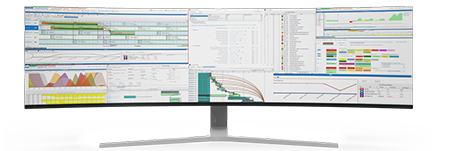Cognitive Automation in Manufacturing
In today's highly competitive market, the Food and Beverage (F&B) manufacturing industry faces numerous challenges such as maintaining product quality, optimizing production efficiency, and meeting ever-evolving consumer demands. To address these challenges, manufacturers are increasingly turning to technology-driven solutions. One such solution that has gained prominence is cognitive automation.
This blog will explore the concept of cognitive automation in manufacturing, focusing on its integration with PlanetTogether and various Enterprise Resource Planning (ERP), Supply Chain Management (SCM), and Manufacturing Execution System (MES) systems, including SAP, Oracle, Microsoft, Kinaxis, and Aveva.

What is Cognitive Automation?
Cognitive automation, at its core, is the fusion of artificial intelligence (AI) and human-like cognitive abilities, such as learning, reasoning, and problem-solving, to automate complex tasks and decision-making processes. In the context of F&B manufacturing, cognitive automation holds immense potential to revolutionize various aspects of production, from supply chain management to quality control.


The Role of PlanetTogether
PlanetTogether is a well-known advanced planning and scheduling (APS) software that plays a pivotal role in optimizing production processes. It helps manufacturers create efficient production schedules, allocate resources effectively, and reduce production costs. When integrated with cognitive automation, PlanetTogether becomes a powerful tool for F&B manufacturers.
Integration with ERP Systems
SAP Integration: SAP is one of the leading ERP systems globally, known for its robust functionalities. When integrated with cognitive automation, it allows for real-time data exchange between production schedules generated by PlanetTogether and SAP's ERP module. This seamless integration enhances visibility, allowing manufacturers to make informed decisions promptly.
Oracle Integration: Oracle ERP offers a comprehensive suite of tools for F&B manufacturers. Integrating cognitive automation with Oracle enables predictive maintenance, demand forecasting, and real-time inventory management. Manufacturers can optimize their supply chain, reduce wastage, and ensure on-time deliveries.
Microsoft Dynamics Integration: Microsoft Dynamics is another popular ERP solution. By integrating cognitive automation, F&B manufacturers can streamline operations, enhance customer service, and improve decision-making. Real-time data analytics, driven by cognitive automation, helps in identifying trends and making data-driven decisions.
SCM and MES Integration
Kinaxis RapidResponse Integration: Kinaxis RapidResponse is a supply chain planning platform. Integrating cognitive automation with Kinaxis allows manufacturers to gain real-time insights into their supply chain, helping them identify bottlenecks, reduce lead times, and optimize inventory levels.
Aveva Integration: Aveva MES is a manufacturing execution system that focuses on improving production efficiency. Cognitive automation integration with Aveva enhances real-time monitoring, quality control, and overall production visibility. Manufacturers can respond quickly to deviations from standard processes and maintain product quality consistently.

Benefits of Cognitive Automation in Manufacturing
Now that we've explored how cognitive automation can be integrated with various systems, let's look into the significant benefits it brings to F&B manufacturing:
Enhanced Efficiency
Cognitive automation eliminates manual and repetitive tasks, allowing employees to focus on higher-value activities. This leads to increased productivity and efficiency throughout the production process.
Improved Quality Control
Real-time monitoring and data analysis provided by cognitive automation ensure that product quality remains consistent. Manufacturers can identify and rectify quality issues promptly, reducing waste and costly recalls.
Accurate Demand Forecasting
Integration with ERP and SCM systems enables accurate demand forecasting. Manufacturers can adjust production schedules and inventory levels to meet consumer demand effectively, reducing excess inventory costs.
Cost Reduction
Cognitive automation optimizes resource allocation, minimizes downtime, and reduces energy consumption. These factors contribute to cost savings for F&B manufacturers.
Competitive Advantage
Manufacturers that embrace cognitive automation gain a competitive edge by delivering products faster, at lower costs, and with superior quality compared to their competitors.
Scalability
As F&B manufacturing facilities grow, cognitive automation systems can scale with them. This scalability ensures that manufacturers can adapt to changing market demands seamlessly.
Cognitive automation in F&B manufacturing is more than just a buzzword; it's a transformative technology that can reshape how the industry operates. By integrating cognitive automation with systems like PlanetTogether, SAP, Oracle, Microsoft, Kinaxis, and Aveva, manufacturers can achieve unprecedented levels of efficiency, quality, and competitiveness.
As the F&B manufacturing landscape continues to evolve, cognitive automation is poised to play a central role in driving success and innovation in the industry.